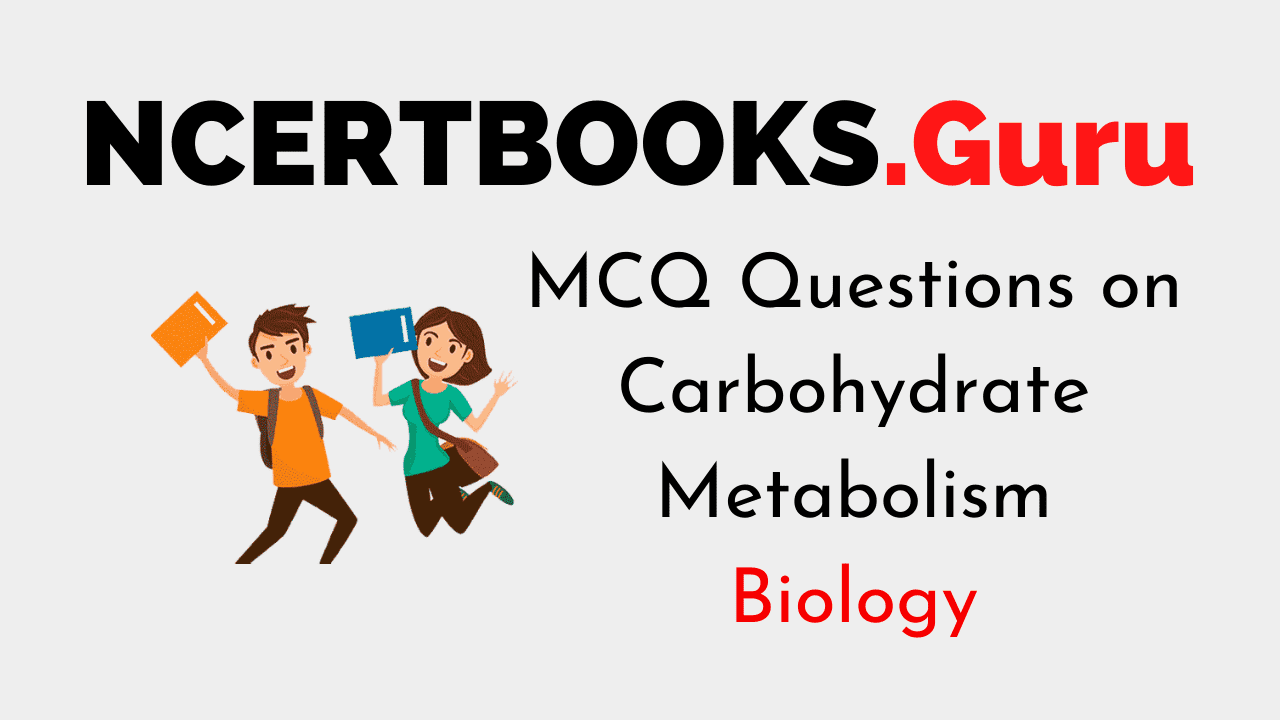Biology is the study of life. Below, You will find a list of Biology MCQ Questions as per the latest prescribed syllabus. Ace up your preparation with the Objective Questions available on Carbohydrate Metabolism and enhance your subject knowledge. Understand the concept clearly by consistently practicing the Multiple Choice Questions and score well in your exams.
MCQ Questions on Carbohydrate Metabolism
1. Which of the following enzymes are not involved in galactose metabolism?
(a) Galactokinase
(b) Glucokinase
(c) Galactose-1-Phosphate Uridyltransferase
(d) UDP-Galactose 4- epimerase
Answer
Answer: (b) Glucokinase.
2. Which of the following enzymes leads to a glycogen storage disease known as Tarui’s disease?
(a) Glucokinase
(b) Pyruvate Kinase
(c) Phosphofructokinase
(d) Phosphoglucomutase
Answer
Answer: (c) Phosphofructokinase.
3. Which of the following enzymes is defective in galactosemia- a fatal genetic disorder in infants?
(a) Glucokinase
(b) Galactokinase
(c) UDP-Galactose 4- epimerase
(d) Galactose-1-Phosphate Uridyltransferase
Answer
Answer: (d) Galactose-1-Phosphate Uridyltransferase.
4. Which of the following enzyme deficiency leads to hemolytic anaemia?
(a) Glucokinase
(b) Pyruvate Kinase
(c) Phosphoglucomutase
(d) Phosphofructokinase
Answer
Answer: (b) Pyruvate Kinase.
5. Which of the following glucose transporters are important in fructose transport in the intestine?
(a) GLUT5
(b) GLUT3
(c) GLUT4
(d) GLUT7
Answer
Answer: (a) GLUT5.
6. Which of the following is a tricarboxylic acid?
(a) Acetic acid
(b) Succinic acid
(c) Oxaloacetic acid
(d) Citric acid
Answer
Answer: (d) Citric acid.
7. Which of the following enzymes plays an important role in tumour metabolism?
(a) Glucokinase
(b) Pyruvate Kinase M2
(c) Phosphoglucomutase
(d) Phosphofructokinase
Answer
Answer: (b) Pyruvate Kinase M2.
8. Which of the following metabolites negatively regulates pyruvate kinase?
(a) Citrate
(b) Alanine
(c) Acetyl CoA
(d) Fructose-1,6-Bisphosphate
Answer
Answer: (b) Alanine
9. The glycerol phosphate shuttle functions in___________.
(a) Lipid catabolism
(b) Triglyceride synthesis
(c) Anaerobic glycolysis for the regeneration of NAD
(d) Aerobic glycolysis to transport NADH equivalents resulting from glycolysis into mitochondria.
Answer
Answer: (d) Aerobic glycolysis to transport NADH equivalents resulting from glycolysis into mitochondria.
10. In muscles, the pyruvate is converted into lactate. Find the correct statement
(a) During lactate formation, NADH is reconverted into NAD
(b) During the product of lactate two ATP are produced
(c) Lactate is the substrate from the downstream pathway
(d) Lactate acts as the substrate for the formation of amino acid
Answer
Answer: (a) During lactate formation, NADH is reconverted into NAD.
11. Which of the following glycolytic enzyme is inhibited by an accumulation of long-chain fatty acid in the liver?
(a) Glucokinase
(b) Hexokinase
(c) Pyruvate kinase
(d) Phosphofructokinase
Answer
Answer: (a) Glucokinase.
12. Which of the following statements is known as the rate-limiting step in glycolysis?
(a) Enolase
(b) Phosphofructokinase
(c) Phosphohexose isomerase
(d) Glyceraldehyde-3-phosphate dehydrogenase
Answer
Answer: (b) Phosphofructokinase.
13. Which of the following hormones decreases blood glucose and increases the uptake of glucose in various tissues like skeletal muscle, adipose tissues?
(a) Insulin
(b) Cortisol
(c) Glucagon
(d) Epinephrine
Answer
Answer: (a) Insulin.
14. What is the net gain of ATP during the conversion of glucose to pyruvate?
(a) 2 ATP
(b) 4 ATP
(c) 6 ATP
(d) 1 ATP +1 GTP
Answer
Answer: (a) 2 ATP.
15. Which of the following hormones is responsible for increasing gluconeogenesis in the liver during prolonged starvation?
(a) TSH
(b) Insulin
(c) Thyroxine
(d) Glucagon
Answer
Answer: (d) Glucagon.
